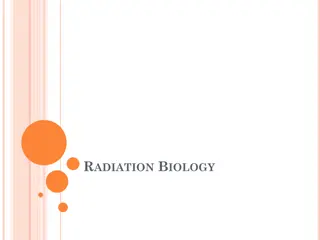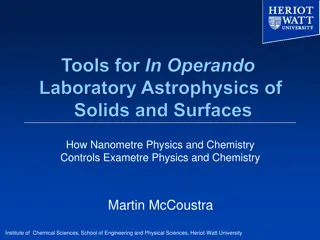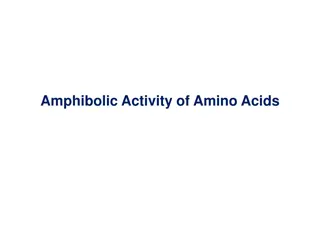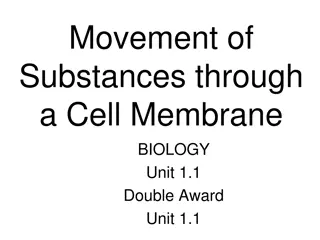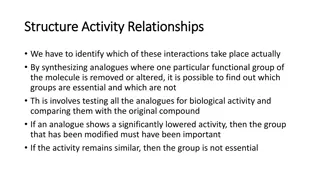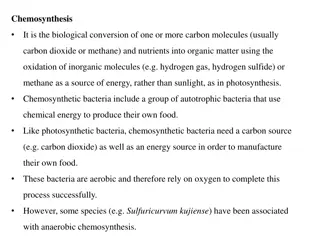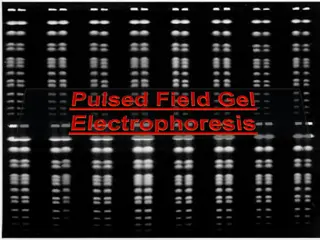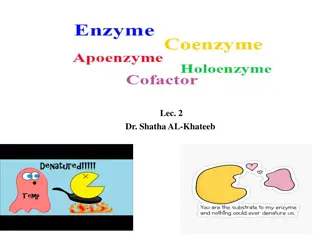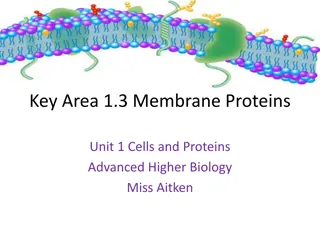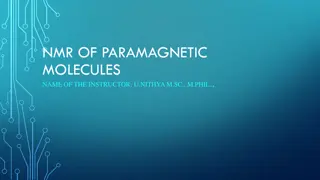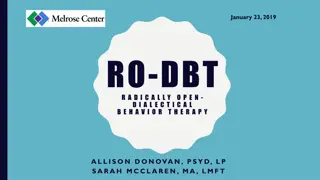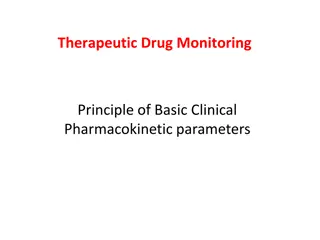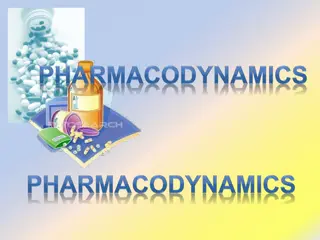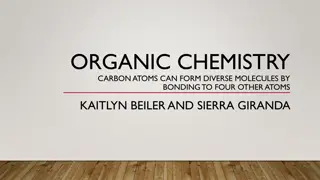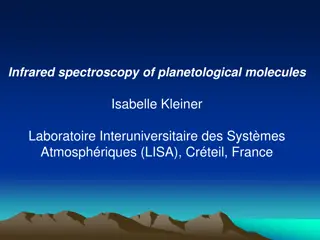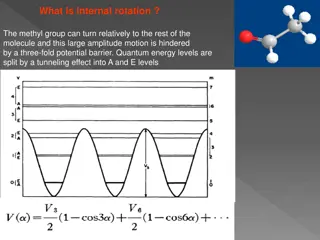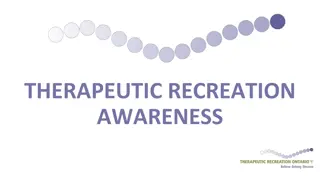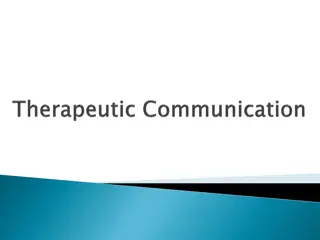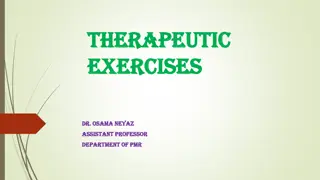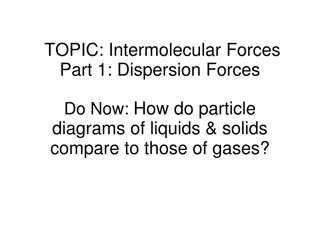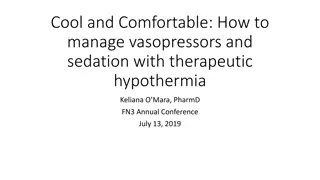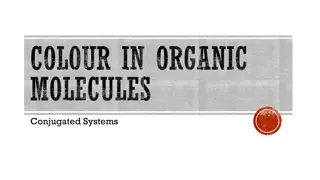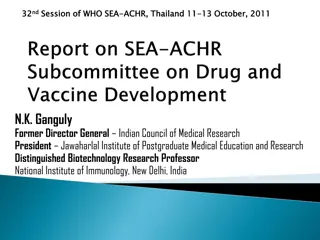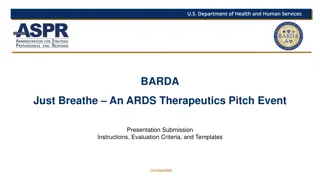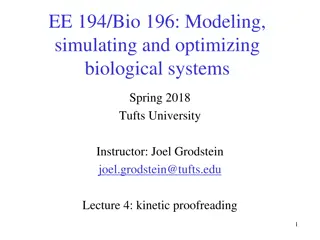RADIATION BIOLOGY
Radiobiology is the study of how ionizing radiation impacts living organisms. It involves direct and indirect effects on biological molecules, leading to the formation of free radicals that can cause cellular damage. The process includes the radiolysis of water, generation of hydrogen peroxide, and
0 views • 64 slides
Understanding Polarity and Oil Spill Impacts
Explore the concept of polarity in molecules and its impact on interactions, learn about the environmental effects of oil spills, and understand methods used for oil spill cleanup. Discover how polar and nonpolar molecules behave differently and the challenges posed by oil spills on wildlife and eco
2 views • 13 slides
Chemically-controlled Cosmos: Insights into Molecular Complexity in Astrophysical Environments
Delve into the intriguing world of the Chemically-controlled Cosmos, where spectroscopic observations reveal over 200 chemical species existing in gas and solid phases. From simple atoms and molecules to complex structures crucial for star formation and potential life seeding, explore the diverse en
8 views • 56 slides
Significance of Amino Acids in Biological Pathways
Amino acids play a crucial role as precursors in various biological processes, serving as building blocks for small molecules like hormones, coenzymes, nucleotides, and more. Glycine, a key amino acid, serves as the major precursor for porphyrins, essential in heme proteins. Understanding the pathwa
0 views • 21 slides
Understanding Movement of Substances Through Cell Membrane
Substances enter and leave cells through diffusion and osmosis processes, driven by concentration gradients. The cell membrane plays a crucial role in selectively allowing substances to pass, ensuring cell survival. Osmosis can be demonstrated using Visking tubing, showing water molecules moving whi
0 views • 15 slides
Understanding the Binding Role of Alcohols and Phenols in Drug Molecules
The role of alcohols and phenols in drug molecules is crucial as they are frequently involved in hydrogen bonding interactions. By creating analogues with modified functional groups, such as ethers and esters, the importance of specific groups can be determined. The presence or absence of hydrogen b
1 views • 20 slides
Chemosynthesis
Chemosynthesis is a unique biological process where organisms convert carbon molecules and nutrients into organic matter using inorganic molecules as an energy source. Chemosynthetic bacteria, such as Venenivibrio stagnispumantis and Thiobacillus species, play a crucial role in various environments
2 views • 21 slides
Pulsed-Field Gel Electrophoresis: Separating Large DNA Molecules
Pulsed-Field Gel Electrophoresis (PFGE) is a technique developed to effectively separate large DNA molecules through the application of an electric field that periodically changes direction. This method, introduced by David C. Schwartz and Charles C. Cantor in 1984, revolutionized the resolution of
1 views • 11 slides
Understanding Enzyme Function: The Key Steps and Importance of Cofactors
Enzymes play a crucial role in catalyzing biochemical reactions by forming enzyme-substrate complexes and facilitating changes in substrate molecules to product molecules. The process involves four steps: proximity of enzyme and substrate, binding at the active site, catalysis leading to substrate a
0 views • 39 slides
Understanding Membrane Proteins and Cell Membrane Permeability
Cell membranes consist of phospholipid bilayers with embedded proteins, including integral and peripheral proteins. Integral proteins span the membrane, while peripheral proteins interact with the surface. Only non-polar molecules can pass through the membrane directly, while charged ions, polar mol
0 views • 30 slides
Understanding Community Advisory Boards in Patient Advocacy
Community Advisory Boards (CABs) play a crucial role in connecting patient advocates with researchers in the field of therapeutic innovation. They review clinical trial protocols, monitor trials, and educate the community. CABs can be established for specific purposes or therapeutic areas. Different
0 views • 15 slides
Understanding NMR Spectroscopy of Paramagnetic Molecules
NMR spectroscopy of paramagnetic molecules is influenced by the presence of unpaired electrons, leading to broadened spectra and complex coupling mechanisms. Quadrupolar nuclei, with spins greater than 1/2, play a significant role in the relaxation and splitting of NMR signals. The interaction betwe
0 views • 19 slides
Understanding Mistakes, Disruptures, and Enactments in Therapeutic Relationships
Exploring the interconnected nature of mistakes, disruptures, and enactments in therapeutic relationships, with a focus on the impact of errors on the therapeutic process and the potential for growth and repair within the relational context. Various models and approaches in psychotherapy are discuss
0 views • 25 slides
Therapeutic Products Bill Consultation Phase: Summary of Purpose and Design
The Therapeutic Products Bill consultation phase in Auckland discussed the purpose and design of the Act to ensure safety, quality, and efficacy of therapeutic products. The team included key advisors from MoH, guiding principles emphasized benefits outweighing risks, and a framework for regulation
0 views • 38 slides
Understanding the Therapeutic Access Point (TAP) for Child Welfare Professionals
The Therapeutic Access Point (TAP) is a crucial multi-disciplinary meeting for determining appropriate therapeutic interventions for children in care. Referrals are made through a structured process, and various professionals, along with parents and carers, attend to discuss the child's needs. TAP i
1 views • 6 slides
Understanding RO-DBT: A Therapeutic Approach for Overcontrolled Clients
Develop a comprehensive understanding of Radically Open Dialectical Behavior Therapy (RO-DBT), a therapeutic approach created by Dr. Thomas Lynch for patients not benefiting from traditional DBT. RO-DBT focuses on enhancing receptivity, openness, flexible control, intimacy, and connectedness in over
0 views • 24 slides
Understanding Therapeutic Drug Monitoring and Clinical Pharmacokinetic Parameters
Therapeutic Drug Monitoring (TDM) utilizes pharmacokinetic principles to optimize drug therapy by balancing efficacy and toxicity levels. Historical background reveals a shift from empirical dosing to precise pharmacokinetic analysis, aiming to minimize toxicity risks and maximize therapeutic benefi
0 views • 47 slides
Understanding Molecules and Chemical Formulae
Explore the world of molecules and molecular formulae, starting from the basic structure of atoms to bonding and predicting chemical formulae. Learn about valency, how atoms bond to form molecules, and how to predict chemical formulas for different elements. Discover the significance of electron con
3 views • 11 slides
Exploring Smells: Molecules and Properties in Chemistry
Dive into the world of molecular structures and smells in chemistry with a focus on distinguishing between molecules with the same formula but different properties. Understand the significance of structural formulas, recognize isomers, and predict the smells of new molecules based on their chemical
2 views • 13 slides
Comprehensive Therapeutic Pilates and Physiotherapy Services by Héctor J. García Umpirrez
Offering a wide range of specialized services including therapeutic Pilates, physiotherapy, medical rehabilitation, sports massage, manual therapy, dry needling, and more. Héctor J. García Umpirrez, a dedicated physiotherapist, provides personalized treatments to address soft tissue pain, sports i
0 views • 5 slides
Understanding Atoms and Molecules: Basics and Models
Explore the world of atoms and molecules with a focus on distinguishing between them, understanding atomic structures through historic models like Bohr and Rutherford, and the modern atomic model. Discover how atoms form the basis of all matter and how they are organized within molecules.
0 views • 20 slides
Understanding Drug Targets and Mechanisms of Action
Explore the intricate world of pharmacokinetics and pharmacodynamics, from drug absorption to their interaction with biological molecules. Learn about different drug targets, such as proteins and ions, and how drugs alter their biochemical and biophysical activities. Dive into molecular mechanisms o
3 views • 17 slides
Understanding Organic Chemistry: Carbon Atoms and Molecular Diversity
In organic chemistry, carbon atoms can form diverse molecules by bonding to four other atoms, leading to molecular complexity and diversity. The versatile nature of carbon allows for the formation of various carbon skeletons, contributing to the vast array of organic compounds. Hydrocarbons, consist
0 views • 12 slides
Understanding Therapeutic Diets for Health Improvement
Therapeutic diets play a crucial role in managing medical conditions by modifying regular diets. These diets are personalized to address specific health concerns and are recommended by healthcare professionals. By controlling the consumption of certain foods or nutrients, therapeutic diets aim to im
0 views • 19 slides
Insights into Infrared Spectroscopy of Planetary Molecules and Space Exploration
Infrared spectroscopy plays a crucial role in studying planetary molecules like NH3, PH3, and CH3CN, aiding in planetary observations and spacecraft missions. Ground-based observatories and spacecraft like GALILEO and Cassini/Huygens provide valuable data for analyzing planetary spectra and modeling
0 views • 13 slides
Insights into Internal Rotation in Molecules
Internal rotation in molecules, such as the methyl group in acetaldehyde and methyl acetate, involves large amplitude motions hindered by potential barriers. Quantum energy levels split due to tunneling effects, impacting rotational and torsional energy levels. Theoretical models like the Rho Axis M
0 views • 6 slides
Integrating Nutrition Assessment and Support for Health Providers: Session on Acute Malnutrition Management
This training session focuses on the management of acute malnutrition through inpatient and outpatient therapeutic care, supplementary feeding programs, and community linkage for early intervention. It outlines the types of therapeutic foods used in nutrition care, discharge criteria for outpatient
0 views • 31 slides
Understanding Therapeutic Recreation: Enhancing Well-being through Leisure
Therapeutic Recreation, as defined by Therapeutic Recreation Ontario (TRO), aims to help individuals with physical, cognitive, emotional, or social limitations acquire skills to enjoy leisure optimally, function independently, and participate fully in society. It involves trained professionals offer
0 views • 11 slides
Enhancing Therapeutic Communication in Health Education
Establishing a therapeutic relationship is crucial in health education to achieve positive patient care goals. Effective therapeutic communication involves planned acts using various techniques to ensure a shared understanding. It focuses on clear, consistent, and direct communication, incorporating
0 views • 35 slides
Understanding Evaporation and Condensation Through Water Molecules
Exploring the water cycle and states of matter, this lesson delves into how ideas about water molecules aid in explaining evaporation and condensation. Through diagrams, simulations, and real-life scenarios, students learn about the movement and changes of water molecules. By comparing their ideas w
0 views • 12 slides
Understanding Matter, Elements, and Molecules
Matter is anything with mass and volume, consisting of atoms. Elements are pure substances with one type of atom. Molecules are groups of bonded atoms. The content explains mass, volume, different forms of elements, allotropes, and compound properties like sodium chloride. It covers chemical symbols
0 views • 37 slides
Understanding Therapeutic Exercises for Health and Wellness
Therapeutic exercises, as guided by professionals like Dr. Osama Neyaz, can significantly impact physical health by targeting specific muscle groups and energy systems. This form of exercise is crucial for preventing and rehabilitating illnesses, promoting cardiovascular health, regulating blood pre
0 views • 29 slides
Understanding Agarose Gel Electrophoresis in Biochemistry and Molecular Biology
Agarose gel electrophoresis is a technique used to separate and analyze DNA or RNA molecules based on size in biochemistry and molecular biology. It involves applying an electric field to move molecules through an agarose matrix towards the positive electrode, with larger molecules moving slower tha
0 views • 11 slides
Understanding Intermolecular Forces and Dispersion Forces in Molecules
Particle diagrams of liquids, solids, and gases reflect distinct arrangements due to intermolecular forces. The existence of substances as gases, liquids, or solids at room temperature is attributed to the forces between molecules known as intermolecular forces (IMF), with dispersion forces being th
0 views • 30 slides
Managing Vasopressors and Sedation in Therapeutic Hypothermia
This presentation discusses the pathophysiology of hypotension in neonates, the role of vasopressors and sedation in neonates with HIE, and the cardiovascular and pulmonary vascular effects of therapeutic hypothermia. It emphasizes the importance of a pathophysiology-based approach to managing vasop
0 views • 66 slides
Understanding Colour in Organic Molecules through Conjugated Systems
Conjugated systems in organic molecules exhibit alternating single and double bonds, leading to unique molecular orbitals and absorption patterns. With increased conjugation, molecules can absorb visible light, producing vibrant colors like the red from lycopene in tomatoes.
0 views • 28 slides
Exploring Moralistic Therapeutic Deism (MTD) - A Contemporary Spiritual Perspective
Delve into the concept of Moralistic Therapeutic Deism (MTD) introduced by Christian Smith, exploring its components of Deism/Theism, Moralistic beliefs, and Therapeutic aspects. Discover how MTD shapes the spirituality of American teenagers through the insights of the National Study of Youth and Re
0 views • 23 slides
Pharmaceutical Innovations in India's Drug Development Landscape
India has been a key player in drug development efforts, with organizations like CDRI, DRDO, and Ranbaxy leading the way in producing a diverse range of therapeutic molecules. With 87% of WHO-prequalified drugs in the SEAR region manufactured in India, the country has made significant contributions
0 views • 62 slides
BARDA Just Breathe ARDS Therapeutics Pitch Event Details
BARDA is hosting the Just Breathe ARDS Therapeutics Pitch Event to find host-directed therapeutic candidates for an upcoming ARDS clinical trial. The presentation covers submission guidelines, event basics, submission deadlines, evaluation criteria, and more. Drug sponsors are invited to participate
0 views • 23 slides
Understanding Kinetic Proofreading in Biological Systems
Kinetic proofreading is a crucial mechanism by which the body accurately discriminates between closely-related molecules, such as mRNA codons and tRNA molecules in the process of protein synthesis. This process ensures that the correct molecules bind together, preventing errors that could have sever
0 views • 55 slides
